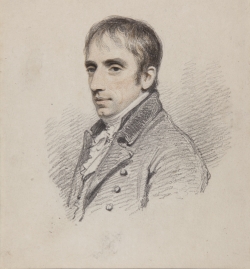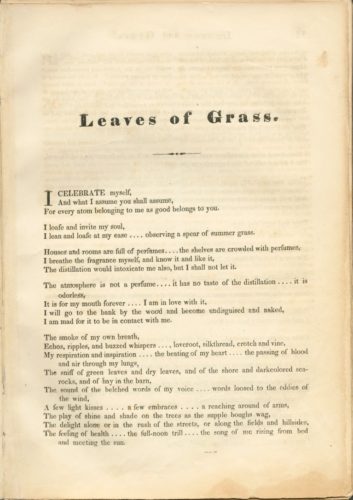Lives with Line-Breaks
It can be difficult to talk about nineteenth-century poetry in ways not steeped in 1) notions of subjectivity as atomistic, interiorized, reflexive, and distinct from (though able to “absorb”) something called “the world” and 2) presumptions of the universality of lyric subjectivity (what Philippe Lejeune calls “the pret-à-porter of emotion”)1Philippe Lejeune, Le pacte autobiographique (Paris: Seuil, 1996), 245. My translation.. The protracted critical episode of Romantic lyricism is not yet finished, even though so many of us have tried to finish with it—for example, those of us who work in the newly renovated field of historical poetics: a loose confederacy of hermeneutic and relativist endeavors to understand what nineteenth-century poets and readers themselves made of poetry and what poetry made of them, including poems like the one Walt Whitman called “Song of Myself.”

Frontispiece, Leaves of Grass, 1855
Whitman’s genitive title announces a poem made both by “myself” and about “myself”: a verse autobiography, less lengthy and detailed than contemporaneous prose works such as François-René de Chateaubriand’s Mémoires d’outre-tombe (1850) and Harriet Jacobs’s Incidents in the Life of a Slave Girl (1861), but nonetheless sharing with them certain basic characteristics:
- a high degree of plausible if not always verifiable correspondence between the poet’s attributes and experiences and those of the poem’s principal subject;
- a significant degree of self-reflexivity or self-awareness, understood as historically and culturally contingent;
- a concern with representing (both depicting and standing for) the plight of human mortality;
- a verifiable commitment to avoid excessive and gratuitous falsification.
Many critics and theorists of autobiography, including Lejeune, are uncomfortable with verse autobiographies and consider prose to be better suited to the recapitulation of a life—not least because of the problem (as Lejeune and others see it) of “the traditional lyric ‘I’” and its tenuous relation to the “clearly autobiographical ‘I’ secured on the proper name of the author.”2Philippe Lejeune, On Autobiography, trans. Katherine Leary (Minneapolis : University of Minnesota Press, 1989), 130. Yet, in the early nineteenth century, there was nothing at all “tenuous” about the relation between the widespread preoccupation with the poetics of subjective experience and the near-simultaneous affirmation of the literary status of “autobiography”—a retronym coined just as Wordsworth began writing the poem that, over 50 years later, his widow Mary would entitle The Prelude, or Growth of a Poet’s Mind; An Autobiographical Poem (1850).

William Wordsworth, portrait by Henry Edridge,1804
Wordsworth’s Prelude seems always to be the exception that proves the spurious rule that autobiographies are written in prose, just as verse autobiography is commonly understood to begin, with Wordsworth and Whitman, as part of the nineteenth-century rebellion against ontological realism still commonly referred to as “Romanticism”—a rebellion that, in the standard narrative, set the stage for later, often “confessional,” verse autobiographies by poets such as Georges Perros, John Berryman, Derek Walcott, and James Merrill.3On The Prelude as exception, see, for example, Paul de Man’s tightly strung essay, “Autobiography as De-Facement,” in The Rhetoric of Romanticism (New York: Columbia University Press, 1984), 68.
Yet both Robert Scott and Caroline Bowles-Southey published verse autobiographies decades before Wordsworth or Whitman. And verse autobiographies got their start at least as early as Ovid’s Tristia (c. 12 C.E.) (Martha Moulsworth’s Memorandum [1632] and Thomas Hobbes’s untitled verse autobiography [1680] are among the first written in English). Indeed, for at least as long as people have been saying “I,” there have been selves: objects of their own awareness, with characteristic ways of facing and addressing their worlds. And at least since the Hellenistic period, the “self” has been, as Michel Foucault puts it, “something to write about, a theme or object (subject) of writing activity.

Frontispiece, The Correspondence of Robert Southey with Caroline Bowles, 1881
That is not a modern trait born of the Reformation or of Romanticism; it is one of the most ancient Western traditions. It was well established and deeply rooted when Augustine started his Confessions.”4Michel Foucault, “Technologies of the Self,” in Paul Rabinow, ed., Ethics: Subjectivity and Truth, trans. Robert Hurley et al. (New York: New Press, 1997), 232. Revision of a 1982 lecture, originally published as “Les techniques de soi,” in Dits et écrits, tome 4: 1980-1988 (Paris: Éditions Gallimard, 1994), 785-814. Nevertheless, neither the presence nor the absence of line-breaks has ever helped an autobiographical writer to secure a stable conceptualization of selfhood—not least because, as Denise Riley observes, any “I” is “necessarily and constantly displaced from my centrality to my own utterance.”5Denise Riley, The Words of Selves: Identification, Solidarity, Irony (Stanford: Stanford University Press, 2000), 2.
Avowals of this paradoxically self-constituting displacement have come in many forms, including the expanded line of Whitman’s “Song of Myself,” which so heartily welcomed into nineteenth-century versification the rhythms of prose and, in doing so, helped make clear that “song” (that is, the musical or ritualistic qualities of versified language) is fully compatible with an empirical subject’s effort to give an account “of myself.”

Whitman’s “Song of Myself” (1855)
Moreover, while Whitmanian extravagance stood far apart from most contemporaneous forms of versification, even the rote instruction of prose composition was, in Whitman’s day, making more and more room for writing steeped in figurative language. Thus, even though Whitman is not classed among the more formally conventional “Schoolroom Poets” (Bryant, Longfellow, Lowell, Whittier, et al.), actual schoolroom writing in the U.S. was becoming, in effect, increasingly Whitmanian—that is, less commonly policed by classical rhetorical principles of moderation.6See Alexandria Peary, “The Licensing of the Poetic in Nineteenth-Century Composition-Rhetoric Textbooks,” College Composition and Communication 61.2 (2009), 149-76.
Empirical subjects who give accounts of themselves are not obliged to deny or suppress the possible ritualistic dimensions of either their own or their readers’ experience of their writing. Songs of self can be both a mimesis of situated speech and a sonorous reverberation of mythotransmission. Yet there remain those who want always to draw a clear line between representation and ritual—and who tend to be impressed not at all by signs in versified language of what Adriana Cavarero calls a “narratable self,” prizing instead the ostensive nullity of a poem’s referent.7Adriana Cavarero, Relating Narratives: Storytelling and Selfhood, trans. Paul A. Kottman (London: Routledge, 2000). Originally published as Tu che mi guardi, to che mi racconti (Milan: Giagiacomo Feltrinelli, 1997). Such “lyric” compartmentalizing brings to mind Hugh Kenner’s gleeful assertion that anyone who tries to imagine a speech-situation for William Carlos William’s wheelbarrow poem is a fool or worse.8Hugh Kenner, A Homemade World: The American Modernist Writers (Baltimore: Johns Hopkins University Press, 1989), 60. But Whitman himself was no stranger to barnyard metaphysics—nor, for that matter, to implausible speech-situations! (E.g., “I might not tell everybody, but I will tell you.”) And, like the “farm-boy ploughing in the field,” making his own versus in the dirt, we should feel good hearing Whitman’s voice binding the versified narration of a life to our own desire for a less indifferent poetics: a historical poetics that would pause where the turning of a line bends toward our own touching aspiration for recognition, however occulted this poignancy might be by irony or arrogance or shame, or by the seeming bewilderment or detachment of one who looks, as if with strange eyes, at something unconfirmable.9Walt Whitman, “Song of Myself,” in Sculley Bradley et al., ed., Leaves of Grass: A Textual Variorum of the Printed Poems, Volume 1: Poems, 1855-1856 (New York: New York University Press, 1980), 78.